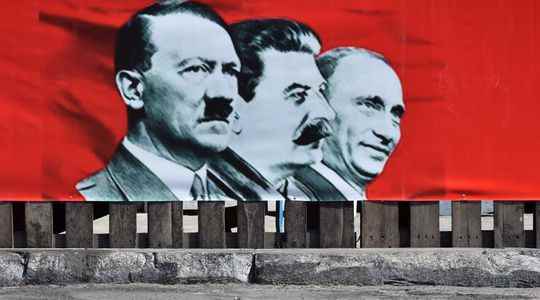In September 2017, the Russian Society of Military History, an organization founded by Vladimir Putin, inaugurated a bust of… Stalin in Moscow. The objective was stated: to allow Russian youth to know an “impartial” version of history, according to the expression of Dmitri Peskov, the Kremlin spokesman. A glorious story, that of the great patriotic victory against Nazi Germany, where the crimes committed between 1922 and 1953 by the “little father of the peoples” are omitted. A historic choice initiated by Vladimir Putin himself, nostalgic for Stalin’s USSR – rather than that of Lenin -, a time when his country reigned over half of Europe.
The ever-revived idea of an enemy for greater Russia
So would the Russian president behave like a spiritual son of the red tyrant? “We are completely in the Stalinist matrix, with this idea of encirclement. It is not new in Putin’s mind but Westerners have just realized it”, explains to L’Express Françoise Thom, historian specializing in Russia. Extend its influence ever further, to protect itself from enemies, fascists, Nazis, Westerners, the names change according to the periods, but the idea remains the same; it is a question of reviving an eternal adversary in order to justify an authoritarian power. “Paranoia is induced by ideology in Stalin, but with Putin it is a kind of professional characteristic due to his training in the KGB”, specifies the author of the book. Understanding Putinism (Ed. Desclée de Brouwer). It is the instrument of the main plan of the Russian president, ideologically audacious, to reconquer the territories of the tsarist Empire from the Urals to the shores of Odessa by employing the methods of Stalinism. A desire for expansion that poses an insoluble equation: the more Russia expands, the more it will feel surrounded.
In domestic policy, Putin is also inspired by the old methods of Stalin. And if he does not decide on quotas of citizens to be arrested at random, he muzzles his population by prohibiting them from accessing non-state networks and demands that his police arrest anyone who opposes his projects. It is thus prohibited since the beginning of the offensive in Ukraine on February 24 to publicly oppose this war, or rather “the operation military special” Russian, to use the vocabulary of the Kremlin. Because words count, and the Russian leader is a follower of the “Orwellian language”, according to the expression of Françoise Thom, who notes in mirror that today “people no longer dare to open their mouths” in Russia, as in the time of the dictator Stalin. darkest of the 20th century. Calling for a “purification” of Russian society, and denouncing the “national-traitors” seen as the 5th column of the West, the master of the Kremlin thus appeals to the memory of the Stalinist purges”.
The filiation is felt even in the economic field, with the desire to depend only on oneself, defended by the ideologue Alexandre Douguine, close to circles of power. Living in total autarky, denying oneself the world, even if it means moving populations to different regions such as Siberia, such is the idea presented at the end of last year by Russian Defense Minister Sergei Shoigu. Extending the settlement space by military conquest, refusing the liberal order, was also the global project of another dictator, Stalin’s sworn enemy, Adolf Hitler.
Two deeply sadistic personalities
Beyond their ways of governing, Stalin and Putin agree on certain character traits. During Russian-German talks in 2007 in the Kremlin, the Russian president lets his labrador into his office, knowing full well that then-German Chancellor Angela Merkel has a phobia of dogs since she was bitten in her childhood. Putin’s little smile leaves little room for doubt, he likes to play with his interlocutors. The latest example is the stammer of the head of Russian foreign intelligence, Sergei Naryshkin, when Putin asks him live on television if he supports the recognition of the independence of the republics of Donetsk and Lugansk. Humiliated for wanting to give “one last chance” to diplomacy, the head of the SVR (External Secret Service) is forced to affirm, mumbling that he is on the same line as his leader.
“There is in Putin as in Stalin a desire to humiliate. On the sadist side, the two can look each other in the eye”, abounds Françoise Thom. Their perverse attitude not only targets their adversaries but also their close collaborators, reduced to the rank of lackeys. On the scale of terror, however, Stalin went further, having, for example, taken the habit of having his advisers sign the acts of deportation of their own wives.
One thing is certain for Françoise Thom, Putin puts the doctrine of his elder into practice. It can be found in a sentence pronounced in 2001 by the chairman of the Foreign Affairs Committee of the Duma: “It is not up to NATO to expand towards the East, it is up to Russia to s ‘Extend West.’ And so will be reborn Stalin’s USSR.
